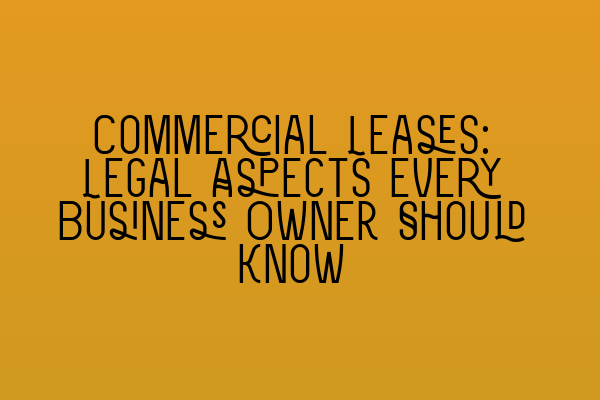Commercial Leases: Legal Aspects Every Business Owner Should Know
As a business owner, finding the perfect location for your company is crucial to its success. One of the most common ways to secure a place for your business is through a commercial lease. But before signing any lease agreement, it is important to understand the legal aspects involved to avoid any future complications or disputes.
What is a Commercial Lease?
A commercial lease is a legal contract between a landlord and a business tenant. It outlines the terms and conditions under which the tenant is allowed to occupy and use the leased property for commercial purposes. The lease agreement covers details such as the duration of the lease, the rental amount, responsibilities of each party, and any specific provisions regarding the property.
It is crucial for business owners to have a clear understanding of the legal aspects of commercial leases to protect their rights and avoid any potential problems down the line. Here are some key legal aspects that every business owner should know:
1. Length of the Lease
The length of the lease is an essential aspect to consider. Commercial leases typically have a fixed term, often ranging between three to twenty years. It is important to carefully consider the length of the lease, as it can have a significant impact on your business’s ability to adapt to changing circumstances and remain flexible.
For example, if you are unsure about the long-term prospects of your business or if you anticipate growth that may require you to relocate, opting for a shorter lease term with renewal options may be more suitable. Alternatively, if you have a well-established business and are confident in its future, a longer lease term may provide stability and security.
2. Rent and Rent Review
The rental amount and the rent review mechanisms are crucial considerations in a commercial lease. The rent amount should be clearly stated in the lease agreement, along with details of any rent increases, how often they will occur, and the method for determining the new rental amount.
Rent reviews can be carried out in several ways, such as fixed increases, market value assessments, or linked to inflation. Understanding the rent review process is essential to ensure that you can afford the rent increases and that they are fair and reasonable.
3. Repairs and Maintenance
Responsibility for repairs and maintenance of the leased property is a vital aspect to clarify in the lease agreement. The lease should clearly outline the obligations of both parties when it comes to repair and maintenance, including who is responsible for the costs.
It is crucial to assess the condition of the property at the beginning of the lease and document any existing damage or issues. This can help protect you from being held responsible for pre-existing problems that may arise later.
4. Use of the Property
The permitted use of the leased property is an essential aspect of a commercial lease. The lease agreement should outline the specific purposes for which the property can be used.
It is important to ensure that the permitted use aligns with your business’s activities. If you have plans to expand or diversify your business in the future, it is advisable to negotiate a broader permitted use clause to allow for flexibility.
5. Break Clauses
A break clause is a provision in a lease that allows either the tenant or the landlord to terminate the lease before its specified end date. Break clauses provide flexibility in case circumstances change and can help business owners avoid being tied to a lease that is no longer suitable.
Understanding the conditions and requirements of a break clause is essential to exercise it correctly, as there are typically specific conditions and notice periods that must be met.
6. Assignment and Subletting
In certain situations, a business tenant may need to assign or sublet the leased property to another party. The lease agreement should outline the conditions and requirements for assignment or subletting.
It is crucial to fully understand these provisions, as they can impact your ability to transfer the lease to another party or gain additional income from subletting.
Consult a Property Law Expert
Commercial leases involve complex legal aspects that can have a long-term impact on your business. It is recommended to seek professional advice from a qualified property law solicitor to ensure that you fully understand the lease agreement, your rights, and obligations.
A property law expert can review the lease agreement, negotiate favorable terms on your behalf, and provide guidance throughout the process. By consulting with a solicitor, you can mitigate the risk of future legal disputes and protect your business interests.
To learn more about commercial leases or to seek professional assistance, contact SQE Property Law & Land Law today. Our team of experienced solicitors specializes in property law and can provide you with the expert advice you need to make informed decisions for your business.
